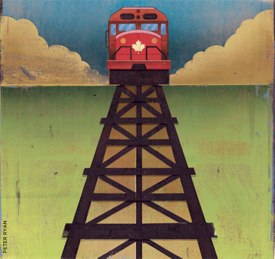
One after the other, Cherokee County Sheriff’s deputies wearing straw cowboy hats dragged bearded, zip-cuffed young men toward a waiting van. Strands of snot and spit set flowing by doses of pepper spray dangled from their bowed heads. A company man wearing a hardhat trailed them, recording a video of the arrests, for liability reasons.
The deputies had puzzled for hours over how to extricate them from the tracks of the heavy machines used to chew through the East Texas pines. In the early morning darkness of November 19, before work crews arrived, the protesters had fastened themselves to the equipment with lock boxes — mechanisms straight from the civil disobedience toolkit. Take a length of PVC or steel pipe, two lengths of chain, carabiners and two willing arms, and you get a few hours of frustration for law enforcement.
Their intention was to halt the advance of what may soon become the longest pipeline outside of Russia or China. Since construction began in August, protesters have used their bodies to tie up heavy equipment or otherwise obstruct workers clearing the pipeline’s path through East Texas. The right of way was secured by TransCanada, the Canadian natural-gas line giant, through an exemption in state law that allows for-profit enterprises to condemn private land if they cannot reach a deal with the landowner.
If President Obama signs off on the entire project, the 1,700-mile Keystone XL pipeline will connect the Alberta oil sand mines to the Texas Gulf Coast, home to the largest refinery complex in the world and gateway to a lucrative international market. But it isn’t the pipeline itself these protesters most fear; it’s what it will carry: as much as 830,000 barrels a day of a form of semisolid petroleum the consistency of asphalt, called bitumen. To render it liquid, it is blended with natural-gas condensate or synthetic crude oil.
Because it is much thicker than conventional sweet crude, the diluted bitumen will move through the pipeline at pressures of up to 1,300 pounds per square inch and temperatures as high as 150 degrees. Opponents, who are not solely a bunch of young enviros but include a number of dyed-in-the-wool conservative East Texans, say a major spill is inevitable.
In the bigger picture, some climatologists fear that digging up Canada’s buried oil sands and burning them will pump massive amounts of carbon dioxide into the atmosphere. So much, in fact, that it may tip the scales against mankind’s stuttering efforts to prevent catastrophic climate change.
For a number of aging, tiny and poor East Texas towns, the issue hits much closer to home. If the pipeline busts, what’s going to happen to the wells they drink from and the rivers they fish?
(Read the full story at the Houston Press)
LOCAL & STATE HEADLINES:
- Influenza virus more potent and reaching Texas sooner (KRIV 26 News)
- Noted physician with passion for music, butterflies dies at 90 (Chron.com)
- Mars Journey: Researchers Test Methods For Doing ‘Astrosurgery’ In Zero Gravity (KUHF Public Radio)
- Running for a Reason (Chron.com)
- Obesity-Cancer Risk Awareness Largely Unknown, Poll Reveals (News 92 FM)
- Giffords interview to air on shooting anniversary (Chron.com)
STATE, NATION & WORLD:
- San Antonio tries to halt mix of guns, domestic violence (Chron.com)
- Overweight-only gym fosters supportive atmosphere (Chron.com)
- Community College Enrollment in Texas Drops (TM Daily Post)
- New cast of lawmakers to fight over usual agenda (AP)
- Texas Comptroller to release budget estimate (AP)
- Analysis: Obama may turn Medicare reform into wider health debate (AP)
- Can Forgiveness Play a Role in Criminal Justice? (New York Times)
- Hearing may be ‘mini-trial’ in Aurora theater shootings (AP)
- Bank Of America To Pay Fannie Mae $3.6B, Buy Back $6.75B In Mortgages (NPR)
- Pope worries about gap between the rich and poor (AP)
